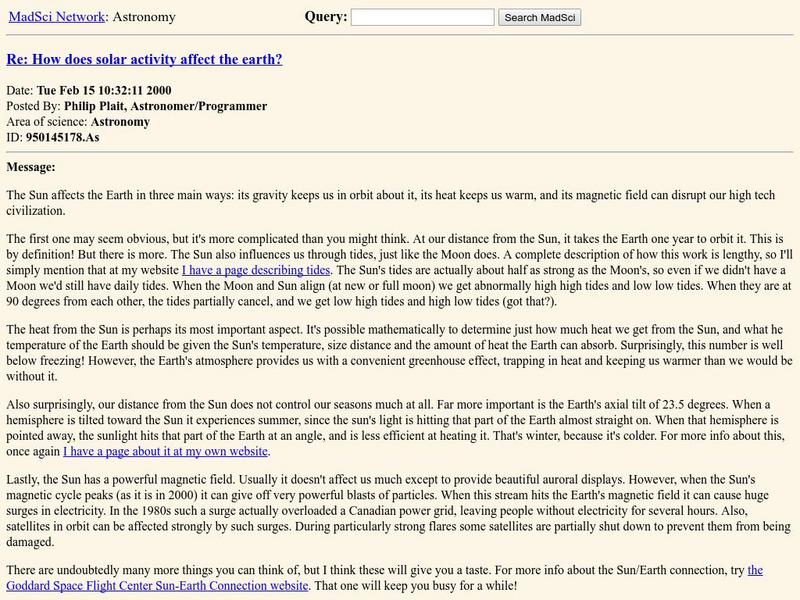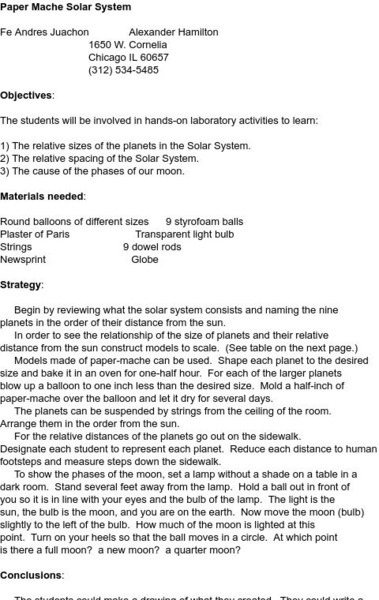Other
Fermi National Accelerator Lab: Discovery of Top Quark
This article announces the discovery of the top quark and its significance in particle physics.
Cosmo Learning
Cosmo Learning: Ocean Currents
The atmosphere forces the ocean in three ways: addition and removal of heat, precipitation and evaporation, and wind stress. The former two processes influence the density of sea water. Gravity acts on these density differences to cause...
Georgia State University
Georgia State University: Hyper Physics: Earth Orbit Velocity
A discussion and statement of an equation for orbital speed. An interactive JavaScript form allows the user to investigate the relationship between orbital height and orbital speed. A very good opportunity to practice and receive...
Other
Wikibooks: Physics Study Guide
A handy resource that gives an overview of equations and definitions pertinent to an introductory, college-level physics course, with two of its three sections focusing on motion-related topics and principles.
Physics Classroom
The Physics Classroom: Satellite Motion
An animation depicting the path of projectiles launched at various launch speeds from the fictional Newton's Mountain. Accompanying text discusses satellite motion and the requirements of orbital motion. Links to further information is...
NASA
Nasa: Kepler and His Laws
This site from NASA provides biographical details about the lives of Tycho Brahe and Johannes Kepler. Discusses Kepler's successes at developing laws of planeatry motion. States the three laws and discusses each one individually....
Other
Steve Spangler Science: Soda Bottle Prank
This resource demonstrates atmospheric pressure using a soda bottle and water.
Math Is Fun
Math Is Fun: Apparent Weight
Apparent weight is explored in this tutorial. Definitions and examples are provided.
Exploratorium
Exploratorium: Your Age on Other Worlds
Enter your birthday and find out how old you are on the other planets in the Milky Way Galaxy. Understand why our age is different on each planet.
Physics Classroom
The Physics Classroom: Circular Motion Principles for Satellites
From The Physics Classroom. Uses easy- to-understand language to discuss how circular motion principles apply to the motion of satellites. Describes the tangential velocity and centripetal acceleration of a satellite. Includes many...
Physics Classroom
The Physics Classroom: Energy Relationships for Satellites
The orbits of satellites are described and an energy analysis is performed. Kinetic, potential and total mechanical energy are explained and applied to the motion of satellites.
Physics Classroom
The Physics Classroom: Kepler's Three Laws
The three laws of planetary motion as described by Kepler are stated and elaborated upon. Useful graphics and an easy-to-understand language are used to explain the nature of planetary motion. Both conceptual and mathematical. Includes a...
University of St. Andrews (UK)
University of St. Andrews: General Relativity
A somewhat labored but thorough explanation of general relativity, beginning with Aristotle. Many links to the personalities connected to the article.
The Wonder of Science
The Wonder of Science: Ms Ps2 4: Gravitational Interactions
Help plan lessons that will facilitate middle schoolers learning about interaction of objects due to the gravitational interactions that are attractive and depend on the masses. Included on site are work samples, phenomena, assessment...
Other
Personal: The Laws of Motion
This personal site explains the physics of angular momentum and their application to flight. Part of a much larger site on the procedures, principles, and perceptions of flight.
Curated OER
Hyper Physics: Earth Orbits
An equation for the law of universal gravitation is stated. The weight equation (W=m*g) is related to the law. An interactive Javascript form allows the user to practice determining the force of gravity and the acceleration of gravity...
Curated OER
Hyper Physics: Earth Orbits
An equation for the law of universal gravitation is stated. The weight equation (W=m*g) is related to the law. An interactive Javascript form allows the user to practice determining the force of gravity and the acceleration of gravity...
Curated OER
Father of Modern Experimentation and Reeko's Greatest Hero
This site provides instructions for a demonstration illustrating the "mystical force called gravity that pulls everything on Earth downward."
Georgia State University
Georgia State University: Hyper Physics: Circular Orbit
The necessity of gravitation to a circular orbit is discussed and equations for the orbital speed are derived from the law of universal gravitation. Binary systems in which two objects orbit about a center of mass are explained and...
Physics Classroom
The Physics Classroom: Cavendish and the Value of G
A short description of how Cavendish measured the value of G - the universal gravitation constant and supported Newton's theory. Illustrated.
NASA
Nasa: Kepler's Third Law
This site from NASA states Kepler's third law of motion and extends it to develop an equation for the velocity of an orbiting planet.
NASA
Nasa: Kepler's Second Law
This site from NASA states Kepler's second law of planetary motion and depicts its meaning with an informative diagram. Relates the law to conservation of energy principles and discusses the eccentricity of a satellite's (or a planet's)...
MadSci Network
Mad Scientist: Why High Tide Away From the Moon or Sun?
An excellent and thorough answer to the often asked question about high tide "bulges" on the side of Earth facing away from the Moon or Sun.
Science and Mathematics Initiative for Learning Enhancement (SMILE)
Smile: Paper Mache Solar System
This site from the Illinois Institute of Technology provides a set of directions for the creation of a solar system model out of paper mache. Includes orbital distances and planet diameters for the nine planets. Great idea for a student...
Other popular searches
- Force of Gravity
- Force and Gravity
- Forces of Gravity
- Calculating Force of Gravity
- Force of Gravity Formula
- Motion Force and Gravity
- Force of Gravity Photos
- Force of Gravity Lessons
- Science Force and Gravity
- Forces of Nature Gravity
- Forces of Flight Gravity
- Forces Gravity













